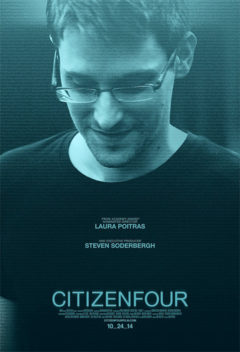Review
‘Citizenfour’ visually reveals monumental Snowden events
February 26, 2015
“Citizenfour,” the 2015 Oscar-winning documentary, provides invaluable visual historical detail of key moments between whistleblower Edward Snowden and journalist Glenn Greenwald that became publicly announced government secrets in 2013.
The actions led to domestic and international debate still being fought today, with security versus privacy being the core hinge point.

Initial reporting was done by Greenwald and Ewan Macaskill. They sat in a Hong Kong, China, hotel, where Snowden traveled to hide, and listened to Snowden explain each document that he acquired. Special care was taken by Snowden to choose material that would not harm others.
The settings were the hotel room, conference rooms, and courthouses. Laura Poitras’ editing makes “Citizenfour” watch like a feature film with suspense. The challenge was the audience already knowing the outcome. Seeing individual clips before viewing the feature means nothing.
Key moments often rolled for long periods, showing Snowden’s varying emotions as the situation developed. His hands shook while thinking of his girlfriend and family the day after Greenwald published the initial story. His family had no idea what he was doing until the initial stories broke.
Poitras’ entrance to the operation began with highly secured emails. The title of the film, “Citizenfour,” is because Snowden signed his emails with that code name to Poitras. Snowden chose her to come film mainly because she had firsthand experiences with high powered government and its fraudulency, which landed her on the secret watch list.
“Citizenfour’s” interviews and production were done in secret over two years and became the last part of Poitras post 9/11 trilogy. The precedings were in 2006 and 2010 on the topics of the Iraq War and Guantanamo titled “My Country, My Country” and “The Oath.” Poitras has won numerous awards for her films and journalism.
Greenwald was working for the Guardian, based in the United Kingdom, when he broke the initial stories. Macaskill was called in to assist Greenwald with reporting and act as an extra set of eyes to observe. He sits with crossed legs in a chair, not looking particularly comfortable, taking hard-core notes with an extra wide j-pad, while he nods his head in complete concentration and understanding to Snowden’s responses. Greenwald got the thicker cushioned chair.
Snowden, the former Booz Allen Hamilton Infrastructure analyst contracted by the NSA, turned into a self-imposed whistleblower upon discovering the NSA’s expansive mass surveillance and data collection of private U.S. citizens.
A major theme throughout the film was that he wanted the story to be about the documents and information and not about his character.
Snowden described how information in every electronic device is potential for NSA collection. Because Snowden is so technical and familiar with the practices, he became paranoid. When speaking on the telephone, he disguises his voice. When entering passwords, a hood goes over the head.
Snowden avoids the decisions of publishing himself by “running the documents through journalists.” Snowden describes the issue as state power versus the people’s power to oppose that power. Snowden used his conscience to prove all allegations about the subject of domestic spying true by others, including William Binney, the former NSA veteran of 30 years that pioneered some mass collection and analysis practices.
In the film, Binney said “downstairs in a parking garage, physically” is still the safest way to communicate, alluding to Deep Throat in the Watergate scandal.
Julian Assange, founder of WikiLeaks, makes a brief appearance amidst his own political predicament, offering only a few comments.
WikiLeaks is an entity for whistleblowers to safely and anonymously dump information.
A group of international lawyers and the ACLU get involved to represent Snowden and see to his defense. Snowden was sentenced in June 2013 under the 1917 Espionage Act, which is described as broad and used for foreign offenders, not whistleblowers. One lawyer said it will be resolved with “95 percent politics and 5 percent law.”
The lawyers also saw to Snowden’s safe travel from Hong Kong to the United Nations. Eventually, Snowden stays in an airport for 40 days until Russia granted him one-year asylum in Moscow, where his girlfriend started living with him again.
The aftermath is Greenwald writes a book, “No Place to Hide,” and cofounds “The Intercept” news project with Poitras. Its goal, according to part one of its short term mission, is to “provide a platform to report on the documents previously provided by NSA whistleblower Edward Snowden.”
The film started premiering all over the world since the Oscars. “Citizenfour” is now finally digitally available with the On Demand Xfinity service until March 24. This documentary deserves five stars because of how dangerous the revelations can become if the large government apparatus turns the key.
Jack Haren is a journalism student with a political science minor. His free time is spent snowboarding, skateboarding, reading, writing, designing, listening, experimenting and living minimally. In the future he wishes to freelance and travel the world.
